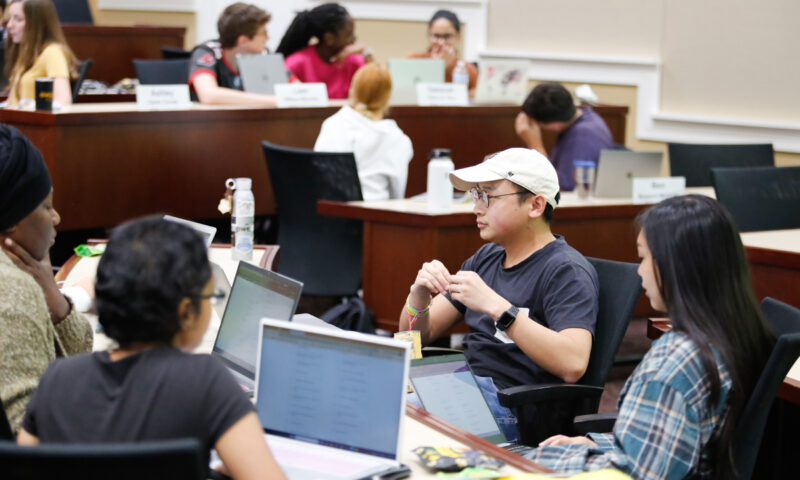Note: This post was written during the 2021-2022 academic year.
Choosing a graduate program can be difficult, but for me, choosing an M.S. in Accounting at McIntire was a no-brainer. Why? Because McIntire offers interesting and unique courses in areas that set students apart after graduation.
The deciding factor for me was the Analytics and Fraud class, offered as a part of the Financial Reporting and Assurance Track, taught by Professor Eric Negangard. The content explores the intersection of forensic accounting and data literacy, creating a unique course from any of my undergraduate classes. Not only is the course content engaging, but students also get to learn new technology that applies to their future careers as accountants.
This class is also consistently a fan favorite. I spoke with three M.S. in Accounting students who raved about the course and Professor Negangard’s teaching style. I also talked to Professor Negangard, who shared a similar sentiment regarding his excitement about teaching the course to McIntire students.
Real Fraud Examples
Students love the course for the collaborative and real-life approach that Professor Negangard takes. Rather than a traditional 75-minute lecture, this class is built around discussions about very technical topics.
Kaylie Yockstick (M.S. in Accounting ’22) specifically mentioned loving the case-driven style of the course. “I like that we work with real fraud cases,” Kaylie said. “It makes us think about things from different perspectives and how one thing can lead to another.” Kaylie also expressed how she expects these skills to translate into her career. “As auditors, we need to be able to understand how fraud cases happen. We need to know what causes them to understand how to look into them and find anomalies.”
Case Studies and Technology Skills
Mackenzie Hudson (M.S. in Accounting ’22) also highlighted the importance of the case studies, saying that these were her favorite aspect of the course. However, Mackenzie also emphasized the technology exposure that the course provides. “This course will differentiate us in the workforce with our technology skills.” Mackenzie said. “We got exposure to software such as IDEA and Alteryx that I did not have in undergrad.” Mackenzie closed by saying that the course topic is naturally interesting. She explained, “Professor Negangard presents the material in a way that takes complex things and really simplifies them. I really enjoy how it is very discussion based, especially for a technical class.”
Approachable Faculty
Finally, Hannah Capestany (M.S. in Accounting ’22,) emphasized similar points with a focus on Professor Negangard‘s approachability. “Professor Negangard really makes it a point to get to know his students personally,” Hannah said. “He is very approachable and personable in addition to teaching an interesting class.” Hannah’s favorite topic covered during the semester was a lecture on Bitcoin and cryptocurrencies. “Learning about Bitcoin is really important to know because the world is becoming more digitalized,” she said. “In today’s society, technology is everywhere and is something that everyone needs to know. It is something that employers look for in the workforce.”
I share very similar opinions with my classmates. This course initially drew me to the M.S. in Accounting program at UVA and did not disappoint. Not only do the students love taking this course, but Professor Negangard loves teaching it and believes it is crucial for accounting students. “It is very important to me that you all start your careers with as much advantage over your colleagues as possible,” he said. “I think the best thing I can do for you all is raise your digital acumen and data literacy. I also very much enjoy exposing you all to non-traditional accounting roles and the wide variety of career paths a degree in accounting and a CPA license can send you on.”
“I recognize that most of you take traditional tax, audit, and consulting jobs, but I also realize that many of you will transition from those traditional paths. The sooner you all have your eyes opened to the multitude of things you can do, the better.” – Professor Negangard
Professor Negangard also reiterated the importance of dialogue within the class. The class, he said, is a collaboration. “I go into the class with high-level topics that I want to talk about, but it is truly guided by the students. It is just a fun class to teach.”
Of the importance of his class, Professor Negangard spoke of the ethics element. “It is not only the recognition that fraud exists but also the recognition that you might be put in a situation you are not comfortable with, and I want you to be able to make the right decision when that time arises.”
Professor Negangard loves teaching in the program because of the diverse student base here at McIntire. “All of you come from different places with different educational backgrounds and experiences,” he said, “and it just adds to the discussion that we have in class.”
Professor Negangard added that he could not pick just one favorite class topic. He mentioned loving both the real-life case studies, as discussed previously, and his lectures on computer forensics and cybercrime. He said of the latter, “In today’s society, the camera is always rolling, and everything you do creates a digital footprint. Being able to use this fact is very powerful in that it helps you tell a story and understand the facts about what transpired. Even outside of a fraud setting, it helps you better understand your business and predict the future.”
It is clear that Professor Negangard enjoys teaching this course as much as students enjoy taking it. Few of the other programs I explored offered similar courses, so naturally, McIntire stood out. This course provides real-world examples of actual fraud committed in the past while equipping students with digital acumen and analytical skills. Exposure to technology and emphasis on collaboration is imperative in the workforce and is one of the many things that sets McIntire’s courses, students, and especially professors apart.



